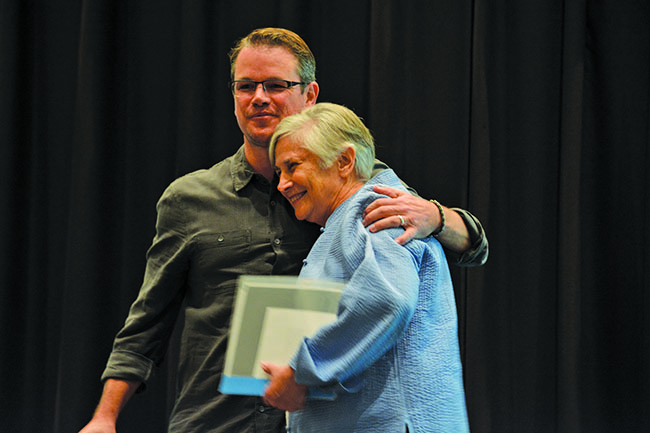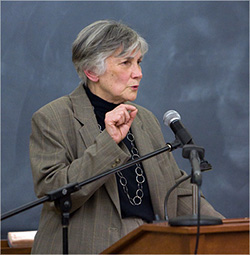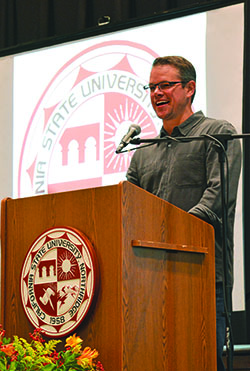

Matt Damon and Diane Ravitch, Ph.D., embraced at CSUN’s Education on Edge speaker series. Ravitch is an avid advocate for education. Photo by John Saringo-Rodriguez / Daily Sundial.
Actor and Academy Award-winning screenwriter Matt Damon introduced Diane Ravitch, the former U.S. Assistant Secretary of Education and a current research professor and historian at New York University, at a lecture hosted by California State University, Northridge’s Center for Teaching and Learning that explored the pressures facing public education in the United States.
Ravitch was the first featured speaker of the center’s Education on the Edge lecture series. A well-respected historian, critic, best-selling author and education analyst with more than 40 years of research and experience, she offered critiques of many popular ideas and trends for restructuring schools, including privatization, standardized testing, punitive accountability and charter schools.
In line with the goals of the lecture series to raise controversial issues to the surface as discussion points and examine uncomfortable truths, Ravitch questioned the popular reasons given for “failing” students. While teachers are often targets for criticism, she suggested that poverty is at the root of the problem.
“The hardest problem that we face is the biggest problem, and that is that the cause of low test scores, the cause of low academic performance, the cause of almost everything negative that happens is poverty,” Ravitch said. “We must reduce poverty in this country.”

Diane Ravitch spoke at CSUN of her educational experiences and promoted her book, “The Reign of Error.” Photo by John Saringo-Rodriguez / Daily Sundial.
She said that amidst the negative talk and focus on low test scores – the crux of the “failure” rates – U.S. graduation rates have not reduced. She pointed out that they are “the highest they’ve ever been in history … We are making progress, and we’ve got to recognize it.”
Ravitch said she was optimistic about the future of America’s public education system, explaining that the duty of education is to create well-rounded, critical, kind individuals who will shortly become the governing minds of society.
“The purpose of education is not to race to higher test scores but to prepare children for the duties and responsibilities of citizenship,” she said. “What matters most is that we have schools where students learn to think about the consequences of their actions; where they learn to treat others with respect; where they learn how to live and work in a world of rapid change; where they gain the knowledge and skills that will bring us one day to a society that is more just, more civil; and where there is, in fact, liberty and justice for all.”
Ravitch’s lecture took place the evening of Oct. 2 in the Northridge Center of the University Student Union.
“Ravitch is a big thinker and a researcher who helps us question the norm,” said Wendy Murawski, the executive director of and Eisner Endowed Chair at the Center for Teaching and Learning. “The goal (of the series) is to bring to campus highly visible individuals who are considered cutting edge in various topics related to education. They are big thinkers who may cause us to question how we currently do things in education.”
The Education on the Edge series provides an opportunity for the greater education community to learn about contemporary research in education policy.
“As a university, it is our duty to deal with and bring to the surface issues surrounding education,” said Michael E. Spagna, dean of the Michael D. Eisner College of Education, which includes the Center for Teaching and Learning. “The speakers we are bringing in reinforce this duty and are committed to truth and informing the public about problems surrounding public education and its discourses. They provide a balanced review of the facts.”

Actor Matt Damon introduced Diane Ravitch to a crowd of more than 700. Photo by John Saringo-Rodriguez / Daily Sundial.
Using his celebrity to highlight a critical topic, Damon noted his appreciation for the work Ravitch has done in the field of public education.
“She’s somebody that I have admired for a very long time,” Damon said. “She’s an amazing person. She’s America’s foremost historian and theorist of education policy. She’s a champion of public education. She’s a courageous leader, and she’s a truth-teller.”
Damon went on to explain her life in education policy and how she has championed the changes she called for in her talk. “She is leading the national movement to preserve public education,” Damon said.
Spagna pointed out that those in the spotlight, including those in the entertainment industry, can use their position to draw attention to the fight for strengthening the nation’s public education system.
“We need people in the public eye to acknowledge and share their cultural appreciation for public school teachers,” he said. “With celebrities like Matt Damon saying educators are important, the appreciation for teachers can be shifted because of the power those individuals wield.”
Damon joined his mother, Nancy Carlsson-Paige, a child development expert and professor emerita at Lesley University; Spagna; and CSUN President Dianne F. Harrison in the audience of more than 700 people to hear Ravitch speak.
The series will continue through the spring semester and among its future speakers are Linda Darling Hammond from Stanford University and Lou Cozolino of Pepperdine University.
For information on how to register online for future events, visit the CSUN Center for Teaching and Learning website.